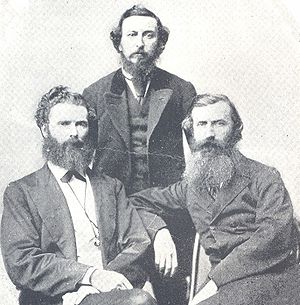
Denis Dowling Mulcahy
Encyclopedia
Denis Dowling Mulcahy was a leading member of the Irish Republican Brotherhood
and a medical doctor.
He was born in Redmondstown, County Tipperary
, Ireland
and later lived at Powerstown, near Clonmel
.
He joined the staff of the Irish People, which was launched by James Stephens on 28 November 1863, with financing from the IRB in the United States. The offices were established at 12 Parliament Street in Dublin. His colleagues on the paper were Charles Kickham
and Thomas Clarke Luby
, while John O'Leary was in charge of the editorial department. O’Donovan Rossa and James O’Connor
had charge of the business office, with John Haltigan being the printer.
 James Stephens entrusted to Luby a document containing secret resolutions on the Committee of Organization or Executive of the IRB. This document would later form the basis of the prosecution against the staff of the Irish People.
James Stephens entrusted to Luby a document containing secret resolutions on the Committee of Organization or Executive of the IRB. This document would later form the basis of the prosecution against the staff of the Irish People.
On 15 July 1865 American-made plans for a rising in Ireland were discovered when the emissary lost them at Kingstown
railway station. Superintendent Daniel Ryan, head of G Division of the DMP
, with this and additional information, raided the offices of the Irish People on 15 September and arrested the staff. Mulcahy was tried and sentenced to a term of penal servitude. He served his term in Portland and Millbank Prisons.
On being released Mulcahy went to France, where he lived for two years, and then came to the United States. After many wanderings he settled in Newark, and engaged in the practice of medicine. He died there in September 1900.
Irish Republican Brotherhood
The Irish Republican Brotherhood was a secret oath-bound fraternal organisation dedicated to the establishment of an "independent democratic republic" in Ireland during the second half of the 19th century and the start of the 20th century...
and a medical doctor.
He was born in Redmondstown, County Tipperary
County Tipperary
County Tipperary is a county of Ireland. It is located in the province of Munster and is named after the town of Tipperary. The area of the county does not have a single local authority; local government is split between two authorities. In North Tipperary, part of the Mid-West Region, local...
, Ireland
Ireland
Ireland is an island to the northwest of continental Europe. It is the third-largest island in Europe and the twentieth-largest island on Earth...
and later lived at Powerstown, near Clonmel
Clonmel
Clonmel is the county town of South Tipperary in Ireland. It is the largest town in the county. While the borough had a population of 15,482 in 2006, another 17,008 people were in the rural hinterland. The town is noted in Irish history for its resistance to the Cromwellian army which sacked both...
.
He joined the staff of the Irish People, which was launched by James Stephens on 28 November 1863, with financing from the IRB in the United States. The offices were established at 12 Parliament Street in Dublin. His colleagues on the paper were Charles Kickham
Charles Kickham
Charles Joseph Kickham was an Irish revolutionary, novelist, poet, journalist and one of the most prominent members of the Irish Republican Brotherhood.-Early life:...
and Thomas Clarke Luby
Thomas Clarke Luby
Thomas Clarke Luby was an Irish revolutionary, author, journalist and one of the founding members of the Irish Republican Brotherhood.-Early life:...
, while John O'Leary was in charge of the editorial department. O’Donovan Rossa and James O’Connor
James O'Connor (Irish politician)
James O'Connor was an Irish journalist and nationalist politician who sat in the House of Commons of the United Kingdom as a Member of Parliament from 1892 to 1910, first for the anti-Parnellite Irish National Federation and then for the re-united Irish Parliamentary Party .He was born in the...
had charge of the business office, with John Haltigan being the printer.

On 15 July 1865 American-made plans for a rising in Ireland were discovered when the emissary lost them at Kingstown
Dún Laoghaire
Dún Laoghaire or Dún Laoire , sometimes anglicised as "Dunleary" , is a suburban seaside town in County Dublin, Ireland, about twelve kilometres south of Dublin city centre. It is the county town of Dun Laoghaire-Rathdown County and a major port of entry from Great Britain...
railway station. Superintendent Daniel Ryan, head of G Division of the DMP
Dublin Metropolitan Police
The Dublin Metropolitan Police was the police force of Dublin, Ireland, from 1836 to 1925, when it amalgamated into the new Garda Síochána.-19th century:...
, with this and additional information, raided the offices of the Irish People on 15 September and arrested the staff. Mulcahy was tried and sentenced to a term of penal servitude. He served his term in Portland and Millbank Prisons.
On being released Mulcahy went to France, where he lived for two years, and then came to the United States. After many wanderings he settled in Newark, and engaged in the practice of medicine. He died there in September 1900.
Sources
- Desmond Ryan, The Fenian Chief: A Biography of James Stephens, Hely Thom LTD, Dublin, 1967
- Leon Ó Broin, Fenian Fever: An Anglo-American Delemma, Chatto & Windus, London, 1971, ISBN 0 7011 1749 4.
- John O'Leary, Recollections of Fenians and Fenianism, Downey & Co., Ltd, London, 1896 (Vol. I & II)
- Joseph Denieffe, A Personal Narrative of the Irish Revolutionary Brotherhood, Irish University Press (1969), SBN 7165 0044 2
- Christy Campbell, Fenian Fire: The British Government Plot to Assassinate Queen Victoria, HarperCollins, London, 2002, ISBN 0 00 710483 9

